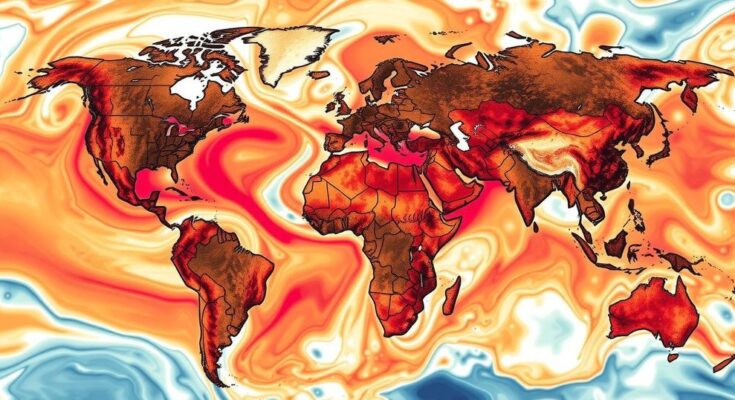In 2024, global temperatures reached record levels, surpassing the 1.5 degrees Celsius warming threshold. Reports from the EU’s Copernicus Program and WMO indicate immediate climate action is essential to prevent further environmental deterioration. UN Secretary-General Antonio Guterres and WMO officials highlight the urgent need for leaders to address escalating climate challenges following this significant temperature increase.
Recent assessments from the European Union’s Copernicus Earth Observation Program and the World Meteorological Organization (WMO) indicate that 2024 has set a new record for the hottest global temperatures. Following the concerning trend observed over the past few years, both organizations confirmed that average global temperatures in 2023 and 2024 have surpassed the threshold of 1.5 degrees Celsius in comparison to pre-industrial levels. UN Secretary-General Antonio Guterres emphasized the urgent need for climate action to mitigate further environmental catastrophes, asserting that immediate measures are necessary to confront the escalating climate crisis.
The WMO’s findings came just days ahead of Donald Trump’s inauguration, a candidate who has previously dismissed climate change as a mere hoax while advocating for increased fossil fuel production. UN Secretary-General Guterres reiterated the dire consequences of climate change, stating that the findings exemplify the reality of global warming. Highlighting the frequent and intense weather occurrences and their resulting implications, WMO Secretary-General Celeste Saulo remarked on the severity of climate events driven by unprecedented levels of greenhouse gases.
While individual years exceeding the 1.5 degrees Celsius mark do not signify a complete failure regarding long-term climate goals set out in the Paris Agreement, Saulo insisted that the incremental nature of warming should be acknowledged. Samantha Burgess from Copernicus attributed the record temperatures primarily to greenhouse gas accumulation in the ecosystem, which has triggered alarming effects such as glacier melting and increased ocean temperatures, indicating an urgent climate response is imperative. With 2024 marking an average temperature 1.6 degrees Celsius above pre-industrial standards, the situation underscores the importance of global cooperation to avert the dangers indicated by the Paris Agreement standards.
The phenomenon of climate change continues to be a pressing global concern, driven primarily by human activities that increase greenhouse gas emissions, notably carbon dioxide from burning fossil fuels. The Paris Agreement of 2015 aims to limit temperature rises to well below 2 degrees Celsius, with efforts to cap the increase to 1.5 degrees Celsius to help avert severe environmental impacts. Yields from research by agencies like Copernicus and WMO have consistently shown alarming trends in temperature increases that not only breach these targets but also manifest in extreme weather patterns including floods, droughts, and rising sea levels.
In conclusion, the alarming rise in global temperatures as reported by both the European Union’s Copernicus Earth Observation Program and the WMO demonstrates the urgent necessity for substantial and decisive climate action. The surpassing of the 1.5 degrees Celsius threshold reflects an unprecedented climatic challenge necessitated by human activities. Global leaders must prioritize comprehensive strategies aimed at combating climate change to mitigate its forthcoming consequences, aligning with the commitments made under the Paris Agreement.
Original Source: en.mercopress.com




